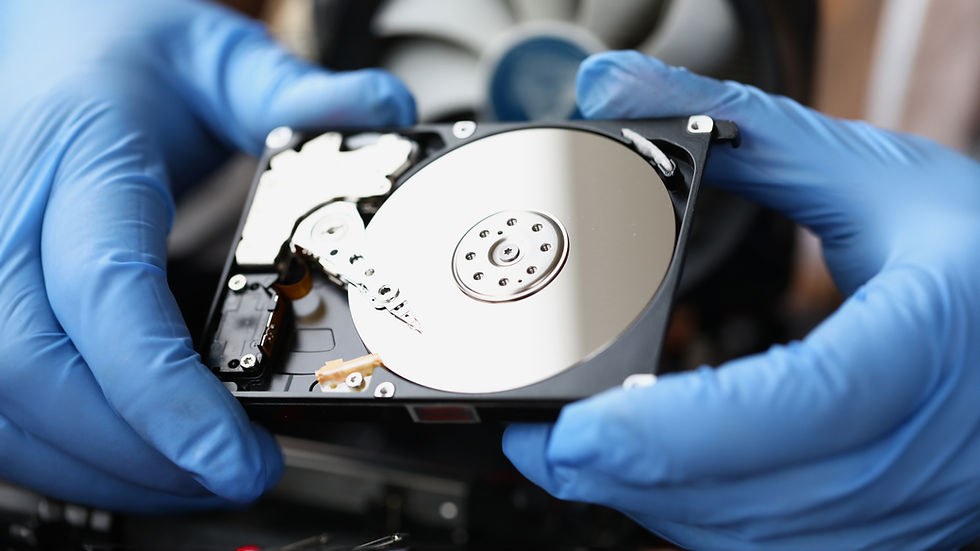How to Fix a Slow Computer: Expert Tips from Tech101
- Tech101

- Jun 7, 2025
- 3 min read
Updated: Jun 20, 2025
A slow computer can be incredibly frustrating. Whether you're working from home, binge-watching your favorite show, or diving into an online game, a sluggish laptop or desktop can disrupt your plans. But what makes a computer slow? Let’s explore some common reasons for this problem and how Tech101 can help you get back on track!
Outdated Software Causing a Slow Computer
One main reason for a slow computer is outdated software. If your operating system or applications aren’t updated regularly, they can drag performance down significantly. For example, Windows updates often bring improvements that can speed up your system. Statistically, around 30% of users do not update their software, which can lead to slower load times, longer boot processes, and security vulnerabilities. Keeping your software current can improve speed and functionality.
Why Software Updates Matter
Updating your software is not just about new features. It also ensures your device runs smoothly. Developers release updates to fix bugs, improve security, and enhance performance. If you want your computer to operate at its best, make software updates a priority.
Too Many Background Processes Causing a Slow Computer
Running too many background processes is another common culprit for slow computers. Many programs automatically run when you boot up your device, using valuable resources like memory and processing power. In fact, some users may have 20 or more startup applications running simultaneously, heavily slowing down their device. By limiting these startup items, you can free up resources, leading to faster performance.
Managing Startup Programs
To manage startup programs, you can use the Task Manager on Windows or system preferences on Macs. Here, you can disable unnecessary applications that launch at startup. This simple step can make a noticeable difference in your computer's performance.
Hard Drive Issues Causing a Slow Computer
A sluggish hard drive can drastically affect your computer's performance. If your hard drive is over 90% full, it may not operate efficiently, causing a notable lag. Additionally, a failing hard drive can not only slow your system down but also lead to crashes and data loss. Regular maintenance, such as disk cleanup and defragmentation (for traditional hard drives), can improve speed.
Is it Time for an Upgrade?
Upgrading to a Solid State Drive (SSD) could boost your computer's speed by up to 500%, making a significant difference in usability. An SSD reads and writes data faster than traditional hard drives, reducing loading times dramatically. If speed is a priority, consider this upgrade.

Malware and Viruses Causing a Slow Computer
Malware and viruses can cripple your system’s performance. They not only slow down your computer but can also steal your data. Statistics show that approximately 60% of users experience performance issues due to malware. Using a reliable antivirus program and regularly scanning your system is essential. A quick scan can often resolve issues and restore speed, ensuring your device is protected and running smoothly.
Protecting Your System
Make it a habit to run antivirus scans at least once a week. Also, avoid downloading unknown software or clicking on suspicious links. Keeping your system clean from malicious software is a proactive way to maintain its speed.
Hardware Limitations Causing a Slow Computer
Lastly, hardware limitations can severely impact your computer’s performance. If you’re using an older machine, it might struggle with modern software or multitasking. Users with just 4GB of RAM may find video editing software or games laggy. Upgrading your RAM or switching to an SSD can enhance performance dramatically. In fact, adding more RAM can improve multitasking efficiency by about 30%.
Identifying Hardware Needs
If your computer is over five years old, it may be time for an upgrade. Evaluate your needs and consider which components are holding you back. Sometimes, a small investment in hardware can lead to substantial performance improvements.
Ensuring a Smooth Experience
Now that you understand some reasons for a slow computer, it’s clear multiple factors can contribute to this irritating issue. Be it outdated software, excessive background processes, hard drive problems, malware, or hardware limitations, each can create a frustrating experience. However, there is no need to handle these challenges alone.
If you’re tired of dealing with a slow computer, reach out to Tech101! Our team of experts is ready to diagnose the problem and provide solutions tailored to your needs. Don't let a sluggish machine hold you back any longer; contact us to set up an appointment and get your computer running like new again!

By addressing the root causes of your slow computer, we can ensure you enjoy a smoother, faster digital experience. Remember, we’re here to help—Tech101 is just a call away!




Comments